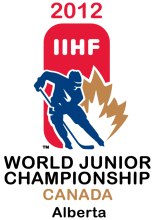CALGARY – Russian goalie Andrei Vasilevski opened the tournament with a 40-save performance in a 3-0 shutout versus Switzerland. Afterwards, the 17-year-old Tyumen native faced a onslaught of bouquets instead of pucks.
The Globe & Mail raved that “a victorious Vasilevski may have cemented the one crack in Russia’s hopes of defending its world junior hockey championship.” NHL.com called him “stellar”, while the Calgary Sun dubbed his World Junior debut “fantastic”.
Well, this is a change of pace. Traditionally, goalies on Russian national junior teams almost never get much credit for their efforts.
In fact, no Russian goalie has been voted by media to the tournament all-star team since 1994 (Yevgeni Ryabchikov) and none have received Best Goalie honours from the IIHF Directorate since 1995 (Yevgeni Tarasov). Russia only captured bronze and silver in those tournaments respectively, and neither goalie went on to notable post-World Junior careers.
To find a Russian goalie who claimed both the aforementioned honours in a gold medal run, you’d have to go back to Anchorage, Alaska in 1989. Alexei Ivashkin got plaudits for his 36-save outing in a 4-2 win over the host Americans, and also got the job done in a 3-2 win versus Sweden.
But was Ivashkin an irreplaceable difference-maker? Not really. The Soviet attack, keyed by Pavel Bure and Alexander Mogilny, potted a whopping 51 goals that year. Nobody else came close. Misha, the old Olympic teddy bear mascot, could have been in net and won gold.
The list of young, prospective inheritors to the legendary Vladislav Tretiak’s throne is extensive but not particularly memorable. Alexander Sidelnikov, Alexander Tyzhnykh, Vladimir Myshkin, and Sergei Mylnikov could never match the standard of the three-time Olympic gold medalist, 10-time World Champion, star of the 1972 Summit Series, and future president of the Russian hockey federation.
Once, it looked like Yevgeni Belosheikin might be the answer. Talented and outwardly self-confident, he was twice a World Junior all-star (1984, 1986) and once chosen as Best Goalie (1986). But after taking a leading role with the Soviet national team at the 1986 IIHF World Championship (gold) and 1987 Canada Cup (second place behind Canada), Belosheikin was tragically consumed by alcohol and other off-ice problems, and committed suicide in 1999.
When looking back at the Russians’ World Junior results, there are numerous cases where they could have won gold instead of Canada if their goaltending had been better.
On New Year’s Day 1988 in Moscow, Jimmy Waite clearly outdueled Alexei Shablanov in a classic 3-2 Canadian win: the shots in that game favoured the Soviets 40-16.
Three years later in Saskatoon, the Soviets outshot Canada 17-3 in the final period of the tournament closer for both sides, but it was John Slaney’s late 3-2 goal on Sergei Sviagin that proved decisive.
In the 2006 final in Vancouver, Anton Khudobin surrendered a weak wraparound goal to Steve Downie late in the first period, at a point when the Russians were outshooting Canada 15-4. Khudobin struggled for the rest of the night, while his red-and-white counterpart, Justin Pogge, got a 5-0 shutout.
So why haven’t the Russians been able to produce outstanding young netminders at rates comparable to Canada, Finland, the Czech Republic, the United States, or Sweden? After all, when you look at Tretiak’s old training videos on YouTube – catching those tennis balls, executing butterfly stances at lightning speed – you’d think the Russians should have been ahead of the curve, constantly turning out a host of super-goalies.
It’s a complex issue. Russian goalies grow up playing in an offensively oriented, pass-first environment. When they come up against the shooters of North America or Scandinavia, it can be tough for them to handle guys blasting away at every opportunity or driving to the net for rebounds.
(At one time, it was also claimed that European goalies in general had weak gloves compared to their North American counterparts because they didn’t play baseball or softball as kids. But this explanation hardly holds water anymore when you look at the excellent catching of Sweden’s Henrik Lundqvist, the Czech Republic’s Tomas Vokoun, or Finland’s Tuukka Rask.)
It’s also fair to say that Russian goalies don’t always get the same support in front of the net from their defencemen as some of the other leading contenders.
And for years, the Russians just didn’t devote as many resources as they could have specifically toward developing physical and mental goaltending skills. This may partially explain why even their young NHL goalies – Sergei Bobrovski of the Philadelphia Flyers and Semyon Varlamov of the Colorado Avalanche – are known to struggle with consistency.
Recently, KHL teams have hired Finnish goaltending coaches to help improve their situation between the pipes. Jussi Parkkila of SKA St. Petersburg and Jorma Valtonen of Lokomotiv Yaroslavl – who did not board the team flight that tragically crashed in September – are two prominent examples.
In last year’s gold medal game, it took two Russian goalies – starter Dmitri Shikin and replacement Igor Bobkov – to deliver the goods in a dramatic, come-from-behind 5-3 victory over Canada.
Here in Calgary, only time will tell if Vasilevski proves to be what Russia needs to win a second straight World Junior title. If he falters, Russia can also look to Andrei Makarov, the workhorse starter for the Saskatoon Blades, who has recorded a 91.3 save percentage and 3.02 GAA in 30 appearances this WHL season.
LUCAS AYKROYD |
 |
 |







